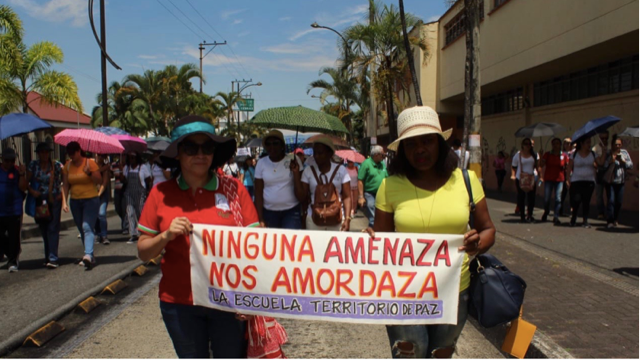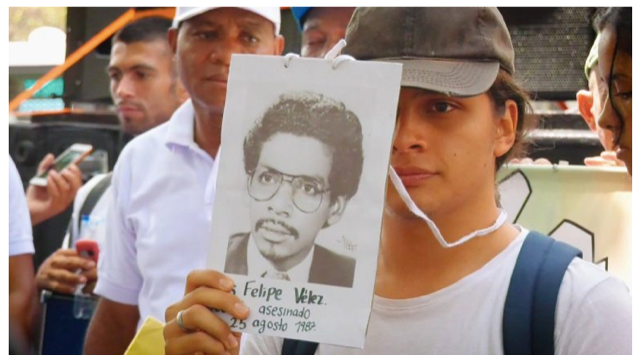By Bob Peterson
Tens of thousands of teachers went out on strike last Thursday. Not in West Virginia or Los Angeles — but in Colombia’s five largest cities.
And they are fighting for their lives. Literally.
The paramilitary group The Black Eagles issued a statement on September 3 saying “the time has arrived to wipe out from this country the so-called ‘union and social leaders’ all of whom are guerrilla employees.”
They sent emails to the leaders of the Colombian Federation of Education Workers (FECODE) naming the people they were going to kill, including the president, vice president, former president, their attorney, and other leaders.
As a result, the union called off a “Caravan in Defense of Life,” that it had planned to tour the Cauca Valley, a region in southwest Colombia with a majority population of Indigenous and Afrocolombians. FECODE instead called for a 24-hour general strike of teachers on September 12.

A key demand of the strike was an end to the killings and threats against teachers and other social activist leaders. In a FECODE press release on September 4 announcing the strike, the top demand listed was that the Colombian President Ivan Duque take immediate measures to defend “the lives and physical integrity of teachers, social and union leaders and a rejection of all forms of violence in the country wherever they come from.” The union also called on the government to implement the peace accord signed three years ago with the FARC, the main guerrilla group.

FECODE’s President Nelson Alarcon told the Colombian newspaper El Tiempo, “We’ve had more than 10 of our colleagues murdered this year. More than 680 teachers were threatened in this period.”
According to data from the National Union School in Medellin, Colombia, more than 1,000 teacher union leaders were assassinated from 1977 to 2014. That would be equivalent to 7,000 teacher union leaders murdered in the United States.
Other key strike demands were implementation of accords agreed upon after previous strikes that include meals for children, improved health care for teachers, better school facilities, and the respect and recognition that schools are “territories of peace.”
Right-wing paramilitary groups and the Colombian military have a long history of targeting union and human rights leaders, community organizers, and environmental activists.
The Black Eagles are an illegal paramilitary group that grew out of an earlier right-wing group, now banned, that had received money from the United States and multinational corporations. The Black Eagles are involved in land theft, illegal mining, and illegal logging, much of which is on Indigenous lands or areas in which many Afrocolombians live. International human rights groups estimate that more than 700 activists have been murdered since the signing of the peace accord in 2016.
The response to the union’s call for a strike was overwhelming. On September 12 there was a massive turn out of teachers, parents, and students in support of the strike in Colombia’s major cities of Bogotá, Bucaramanga, Cali, Medellin y Barranquilla, and in dozens of smaller communities.
Unions throughout Latin America and from Education International, expressed solidarity.
As we continue to focus on the extraordinary teacher militancy throughout the United States, let’s remember that the movement for educational justice is global. We need to support — and learn from — the important teacher struggles in Colombia and around the world.
———
Bob Peterson is a founding editor of Rethinking Schools, former 5th-grade teacher, and a past president of the Milwaukee Teachers’ Education Association. He is currently the city-wide representative on the Milwaukee Board of School Directors. To contact Bob Peterson, email bob.e.peterson@gmail.com.
More information can be found at FECODE and via the hashtags #YoApoyoAFecode (ISupportFecode) and #PorMisMaestros (#ForMyTeachers).
For a more detailed article on the struggle of teachers in Colombia and the role of the United States see, “Teachers and the Colombian Peace Accord: Books versus Bullets”.
